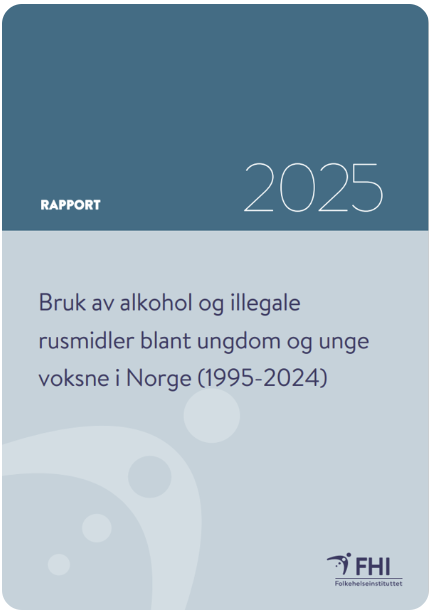Increasing alcohol and cannabis use among youth and young adults in Norway- what does the data tell us?
Alcohol, DrugsElsa Larsson Scott, Scott, Bachelor’s student in sociology at Uppsala university Publicerad 11 Feb 2026
This article examines how alcohol and cannabis use among young people in Norway has changed in recent years, based on new analyses from the Norwegian Institute of Public Health (FHI). Drawing on data from long-running national surveys, it describes developments in levels of use, patterns of consumption, perceptions of risk, and related consequences among adolescents and young adults.
In a report published in August 2025, researchers Inger Synnøve Moan and Elin Bye document an upward trend in both alcohol and cannabis use among youth and young adults in Norway. The report is based on self-reported data from The European School Survey Project on Alcohol and Other Drugs (ESPAD), conducted every four years among 15–16-year-olds since 1995, and the national drug survey, which has surveyed the Norwegian population annually since 2012. While the latter includes respondents aged 16–79, the report focuses specifically on young adults aged 16–30.
Trends in alcohol and cannabis use
Overall, the findings point to a relatively stable but noticeable increase in alcohol use among adolescents between 2012 and 2024. The share of 15-16 year- olds who reported drinking alcohol in the past month rose from 26 per cent in 2019 to 32 per cent in 2024. In the same year, 47 per cent of adolescents in this age group and 86 per cent of young adults aged 16–30 reported having consume alcohol during the past year. Heavy drinking has also become more common among 15–16-year-olds since 2019. A notable change is seen in gender patterns; in 2024, a significantly larger share of young women than young men reported heavy drinking, marking a shift from earlier trends in alcohol use among youth.
Cannabis use has also increased among young people. The proportion of adolescents reporting any cannabis use rose from 8 to 10 per cent between 2019 and 2024 and has nearly doubled since 2011. The increase is most pronounced among young women. Although cannabis use remains more prevalent among young men, the gender gap has narrowed considerably over time.
At the same time, fewer young people associate regular cannabis use with a high level of risk or harm – a perception that has been declining steadily since the early 2000s. Cannabis use is also linked to alcohol consumption: young people who use cannabis tend to drink more frequently and engage in binge drinking more often than those who do not. More than half of those who use cannabis report combining it with alcohol. The rise in cannabis use has occurred alongside a gradual increase in use of other illicit drugs such as cocaine and ecstasy/MDMA among the respondents. Cocaine use among young adults in 2024 is for example now at its highest recorded level since measurements began.
Perceived access to both alcohol and cannabis has increased significantly among 15–16-year-olds in recent years. Peers are the most common source of alcohol, while other adolescents report taking alcohol from home without permission or purchasing it through social media. At the same time, a growing share of adolescents say they receive alcohol from their parents to bring to parties, a practice that has become more common between 2019 and 2024
Consequences and associated risks
As alcohol use and heavy drinking have increased among youth and young adults in Norway, reports of negative consequences have also become more common. For example, the proportion of adolescents reporting accidents or injuries related to alcohol rose from 14 to 20 per cent, while involvement in fights increased from 10 to 14 per cent. In addition, 17 per cent reported being so intoxicated that they could not remember how they got home, up from 13 percent in 2019.
A similar pattern is seen for cannabis. As use has increased, more adolescents report experiencing problems linked to their consumption. Reports of emotional problems, such as anxiety, rose from 7 to 17 per cent, while memory problems increased from 9 to 16 per cent between 2019 and 2024.
Questions for future research: Demographic differences, gender convergence and digital risk environments
These developments raise several questions for future research. One important area concerns demographic differences: to what extent do factors such as socioeconomic background or urban–rural divides help explain variations in substance use among young people? Another interesting topic is the growing gender convergence. What might account for the narrowing gap in alcohol and cannabis use?
Finally, in today’s digitally saturated environment, it would be valuable to examine the role of social media and other online platforms in shaping access to substances, influencing norms and creating new pathways for distribution. Examining these dynamics more closely could offer valuable insights for future research on alcohol and cannabis use among youth and young adults.
The article is written by
Elsa Larsson Scott, Bachelor’s student in sociology at Uppsala University
On the request of PopNAD




